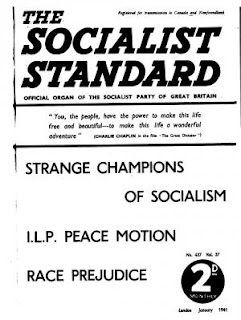The following letter has been received from Mr. Maurice Hely-Hutchinson, M.P. : —
House of Commons, S.W.1.
November 30th, 1940.
To the Editor, THE SOCIALIST STANDARD.
Sir,
I write to thank you for your courtesy in sending me a copy of your issue of November, 1940, containing an article entitled “Incentive Under Socialism” over the signature “H.,” in which the writer points to some actual and some apparent exceptions to a general statement of mine that “there must be a hierarchy of incomes if there is to be a hierarchy of responsibility.”
The article is all the more stimulating because it is both pleasantly and temperately stated. I do not know to what extent it may be your policy to open your columns to a reply, but may I say at the outset that as the “truths” of “Capitalism” rest on an empirical rather than a doctrinal basis, then if, and to the extent that they fail in practical application, they call for qualification.
As a background to a reply, here, in very condensed form, are some of these “truths” ; and it will be apparent that each one of them falls short of universal application. Indeed, as I think Aristotle taught, the only abstract truths are mathematical; in life itself, there can be no such thing as truth and justice except in relation to a set of facts.
The fundamental human urge is parentage. The unit of society is the family, not the individual or the State; and, as the late Pope declared, “The Head of the Family is above the State.”
The bias of capitalism is towards personal rather than collective responsibility. Some form of reward is necessary to induce people to accept increased responsibility. Hemmed in as most of us are by pitiless circumstance—and this applies not only to the poor—this reward must be in most cases, to a great extent, material. This does not exclude other forms of reward. It is possible, for example, to give instances of persons who have refused Cabinet Office not directly on account of the loss of income involved, but because that loss of income would have involved sacrificing their children’s education: otherwise they would gladly have accept the lesser income.
The maximum of satisfaction is likely to result from leaving people free, as far as possible to contract for their own goods and services, to their own best advantage as they see it (undoubtedly this will not prevent some people being dissatisfied with the result), and to take the consequences of their decisions, e.g., of rating their goods or services so high that they fail to sell them. It is undesirable that an Officer of the State should be the judge of individual advantage, for tastes differ.
Enterprise and invention are essentially qualities of the individual. The State is only a fabric of organisation, it has no personal life. While many activities, especially those which have themselves become standardised can best be conducted—and are so conducted—by the State, improvements and extensions, and new activities are most likely to come into being as a result of individuals using their own initiative in pursuit of what they conceive to be their own advantage.
As Henry Maine wrote, the history of emancipation is the story of progress from “status” to “contract.”
As a result of freedom of contract many anomalies appear. But no substitute which the wit of man can devise will ever prevent strong men and beautiful women from getting more than their neighbours. Is this a bad thing? Admittedly it is easier to grieve with the sad than to rejoice with the glad—but that is because of the universality of jealousy. It is untrue that all men are equal; nor is it desirable that either they or their circumstances should be; there must be a difference of potential if the current is to flow ; nor can it be said that social justice will be achieved by seeking to make all men lie on the bed of Procrustes.
It is not possible to conceive of productive property save in conjunction with the idea of management, and of responsibility therefor. There can be no such thing as wealth without intelligent direction; the tests of intelligence must, from the nature of things, be empirical rather than theoretical; there is no mechanical substitute for judgment. It is because of the association of productive property with management that the State has from the earliest times recognised and supported the testamentary power, to ensure the continuity of management and therefore of production; and parallel with the growth of forms of property divorced from the responsibility of management, e.g., stocks, shares and particularly debentures, taxation of unearned income and on property passing at death has progressively increased. As to the concentration of large, or relatively large amounts of property in individual hands, this is to the advantage of the community if the owner’s capacity for management is above the average. If it is not, nothing can long prevent a fool and his money from being soon parted. Bankruptcy and the sack are the safety-valves of capitalism. The noise of history is made by the clatter of the wooden sabots going upstairs and the “frou-frou” of the silken petticoats coming down.
Finally, Sir, let me acknowledge the truth of what Taussig, the American economist, once wrote. So long as life presents to one man the chances of battle, of reward for accomplishment, of great prizes for the taking of great risks or the exercise of great talents, while to another it presents nothing but the intolerable prospect of hopeless competition with better equipped superiors, so long will the endless debate as to the relative merits of private enterprise and Socialism continue.
Yours faithfully,
Mr. Maurice Hely-Hutchinson.
Reply
Our correspondent, Mr. Hely-Hutchinson, covers a great deal of ground in his letter, so much, indeed, that it is impossible to deal with each separate point. There is, however, a general observation that can be made on the whole letter. While giving an account of what are described as the truths of Capitalism, and explaining why they are only partly applied, Mr. Hely-Hutchinson does not explain what is the ultimate basis of these “truths.”
Is the ultimate basis nature, including human nature ? Or is it, as Socialists perceive, the particular form of private ownership known as the Capitalist form? If these “Capitalist truths” are merely the ways of adjusting industry to the needs of the privileged class, then it is necessary for our correspondent to go farther into the question of having a different basis (common ownership) for which these adjustments will not be required.
While it may be highly convenient, under Capitalism, to make some approximation to relating the wages of grades of workers to their degree of responsibility to the Capitalist for the safeguarding of his property, no such need will exist when Socialism replaces Capitalism, and there is no longer a wages system. Socialists do not agree that human beings cannot and will not accept responsibility except on the condition that it carries a higher income. All kinds of voluntary activities carried on now show this to be untrue. Mr. Maurice Hely-Hutchinson will readilv recognise this in the conduct of voluntary political organisations (the S.P.G.B. among them), and in the field of amateur athletics, dramatic societies, choirs, music societies, expeditions of exploration, etc. A very large part of the population habitually accept responsibility in some activity or other for which they do not receive an additional income.
Conversely, and this is vital for the apologists of Capitalism, a willingness and capacity to accept responsibility has exceedingly little to do with the ownership of property to-day. At one time the apologists would have maintained that Capitalists are “self-made men,” and that this demonstrates their superior right to own property. Nowadays, this is utterly untenable since it is common knowledge that the great bulk of the wealth of the present generation of Capitalists is inherited. Mr. Hely-Hutchinson offers instead the plea that “nothing can long prevent a fool and his money from being soon parted,” but this, again, does not now accord with the facts. The wealthy “fool” has his investments spread over many concerns, and has at his disposal paid advisers who are not fools.
Again, personal responsibility for the management and direction of industry is becoming the exception. Personal responsibility is merged into the collective responsibility of companies, corporations, etc., and it is not true that “there can be no such thing as wealth without intelligent direction.”
In the concluding paragraph of his letter, Mr. Hely-.Hutchinson quotes a passage from the American Economist, Taussig. If Taussig meant that the propertyless workers are always at an enormous disadvantage as compared with the few who own the means of production and distribution, and that out of this arises the workers’ growing interest in Socialism, Socialists can agree. But there is nothing to indicate that either Taussig or our correspondent really appreciates the truth about the workers’ disadvantageous position. Elsewhere in his letter Mr. Hely-Hutchinson refers to Henry Maine’s theory that “the history of emancipation is the story of progress from status to contract.” It is interesting here to consider the words used by Maine in his “Ancient Law” (end of Chapter V). He says: —
“Starting . . . from a condition of society in which all the relations of Persons are summed-up in the relations of Family, we seem to have steadily moved towards a phase of social order in which all these relations arise from the free agreement of individuals.”
He goes on to say that “the status of the slave has disappeared—it has been superseded by the contractual relation of the servant to his master.”
The important point to notice about this is that Maine thought he could see “the free agreement of individuals.” Socialists point out that there is not, and cannot be, any such thing as “free” agreement of workers and employers, because the workers are without access to the means of production and distribution, except by the consent of, and on the conditions laid down bv, the owners. The progress envisaged bv Maine has only run half its course. Socialism will finish it and achieve actual emancipation.
Briefly replying to other points in the letter, it is surely wrong that “the fundamental human urge is parentage”—before it comes hunger. And the unit of Capitalist society is not the family—the State applies its penalties to the individual in the main.
Also, though, perhaps, this is a matter of taste and opinion, is it really true that all our Capitalists are “strong men and beautiful women”? Who are these company directors and millionaire captains of industry who frequent the spas ? And is Lady X——? really beautiful?
Edgar Hardcastle










